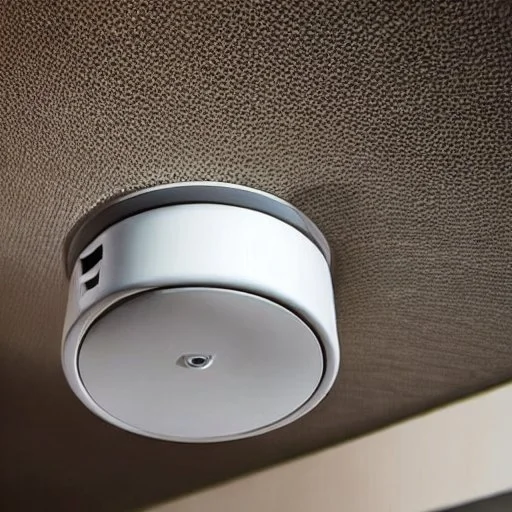July 19, 2025

In the blink of an eye, a spark can turn into a raging bushfire, engulfing everything in its path. In this fast-paced world we live in, where time seems to slip through our fingers like sand, it is crucial to be prepared for unforeseen disasters. As the saying goes, 'an ounce of prevention is worth a pound of cure.' This idiom vividly captures the essence of the importance of smoke alarms in Australian homes.
Smoke alarms serve as silent guardians, tirelessly standing guard against the threat of fire. They are not just mere gadgets; they are indispensable life-savers that can mean the difference between life and death. The significance of these devices has been recognized by legal requirements enforced across Australia.
This article will explore the legal obligations surrounding smoke alarm installation in Australian homes and delve into the types available that cater to specific needs. Furthermore, it will shed light on how these humble devices have saved countless lives over the years. Lastly, it will emphasize the crucial role that maintenance and testing play in ensuring their effectiveness.
By understanding and implementing proper fire safety measures within our homes, we can create a sense of belonging knowing that we have taken necessary steps to protect ourselves and our loved ones from potential disaster.
One interesting statistic regarding the legal requirements for smoke alarms in Australia is that 56% of residential fire fatalities between 2006 and 2010 occurred in properties without working smoke alarms, highlighting the critical importance of these devices in saving lives.
In response to this alarming data, the Australian government has implemented strict regulations regarding smoke alarm installation in residential homes. These regulations state that all residential buildings must have smoke alarms installed on each level, including basements and attics. The alarms must be interconnected so that if one alarm detects smoke, all alarms will sound simultaneously. Additionally, the regulations require that the smoke alarms comply with certain technical specifications to ensure their effectiveness.
Failure to comply with these regulations can result in hefty fines and penalties. It is evident that these legal requirements play a crucial role in safeguarding Australian homes from devastating fire incidents by ensuring proper smoke alarm installation and adherence to set standards.
Different types of detectors are available for installation in residential buildings within Australia. When it comes to smoke alarms, homeowners have the option to choose between battery powered and hardwired models. Battery powered smoke alarms are cost-effective and easy to install as they do not require any electrical wiring. On the other hand, hardwired smoke alarms are connected directly to the home's electrical system and may provide a more reliable power source.
Another consideration is the choice between smart smoke alarms and traditional ones. Smart smoke alarms offer additional features such as smartphone connectivity and remote monitoring capabilities, providing homeowners with increased control and convenience. Traditional smoke alarms, while lacking these advanced functionalities, still serve their primary purpose of detecting smoke and alerting occupants in case of fire.
Ultimately, selecting the right type of smoke alarm depends on individual preferences and needs.
Smoke alarms are really important for keeping people safe from fires. They can quickly detect when there might be a fire and let everyone know so they can get out of the house quickly. Smoke alarms have gotten better over time and now they can all be connected together. That means if one alarm goes off, all the others will too, so everyone in the house will know there's a fire. This is especially useful in big houses or buildings with multiple floors where one alarm might not be enough to reach everyone. Interconnected smoke alarms give people more time to get out of a fire and reduce the chances of getting hurt.
Contrary to popular belief, the vigilance required for the proper maintenance and regular testing of smoke alarms is often overlooked by homeowners. Smoke alarm installation is just the first step in ensuring their effectiveness. Regular maintenance is crucial to ensure that these life-saving devices are in good working condition.
It is recommended to test smoke alarms once a month by pressing the test button and listening for the audible alert. Additionally, cleaning the alarms from dust or debris can prevent false alarms triggered by particles in the air. Common causes of false alarms include cooking fumes, steam from bathrooms, or even insects entering the unit.
By regularly maintaining and testing smoke alarms, homeowners can guarantee their functionality and maximise their potential to save lives in case of fire emergencies.
To effectively foster a culture of fire safety within households, it is essential to provide comprehensive education to family members regarding the necessary precautions and actions to take in the event of a fire emergency.
One important aspect of this education is teaching children about fire safety. This can be achieved by explaining the potential dangers associated with fires and teaching them how to respond appropriately.
Fire drill procedures should also be practised regularly, enabling family members to become familiar with evacuation routes and emergency protocols.
By incorporating these practices into family routines, children develop an understanding of the importance of fire safety and are better prepared to respond in case of an emergency.
Educating your family on fire safety not only helps protect their lives but also contributes to creating a sense of belonging within the household as everyone works together towards a common goal of ensuring their own safety.
Smoke alarms play a crucial role in ensuring the safety of Aussie homes.
The legal requirements for smoke alarms highlight their importance and emphasise the need for compliance.
Different types of smoke alarms are available to cater to specific needs and provide maximum protection against fire hazards.
Regular maintenance and testing by local sparkies like EA Electrics in Sydney, NSW, ensure their effectiveness throughout the year.
While some may argue that smoke alarms can be pricey, it's important to prioritise safety over cost as they save lives and prevent potential disasters.